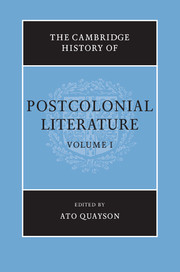Book contents
- Frontmatter
- 1 Introduction: postcolonial literature in a changing historical frame
- 2 Postcolonial fictions of slavery
- 3 Postcolonialism and travel writing
- 4 Missionary writing and postcolonialism
- 5 Postcolonial auto/biography
- 6 Orality and the genres of African postcolonial writing
- 7 Canadian literatures and the postcolonial
- 8 Postcolonialism and Caribbean literature
- 9 Postcolonialism and Arab literature
- 10 Postcolonialism and postcolonial writing in Latin America
- 11 Postcolonial writing in South Africa
- 12 Postcolonial literature in Southeast Asia
- 13 Postcolonial South Asian poetry
- 14 Postcolonial writing in India
- 15 Postcolonial writing in Australia and New Zealand
- 16 Indigenous writing in Canada, Australia and New Zealand
- 17 Postcolonial writing in Ireland
- 18 Postcolonial writing in Britain
- 19 Postcolonial writing in France
- 20 Postcolonial writing in Germany
- References
19 - Postcolonial writing in France
Published online by Cambridge University Press: 28 January 2012
- Frontmatter
- 1 Introduction: postcolonial literature in a changing historical frame
- 2 Postcolonial fictions of slavery
- 3 Postcolonialism and travel writing
- 4 Missionary writing and postcolonialism
- 5 Postcolonial auto/biography
- 6 Orality and the genres of African postcolonial writing
- 7 Canadian literatures and the postcolonial
- 8 Postcolonialism and Caribbean literature
- 9 Postcolonialism and Arab literature
- 10 Postcolonialism and postcolonial writing in Latin America
- 11 Postcolonial writing in South Africa
- 12 Postcolonial literature in Southeast Asia
- 13 Postcolonial South Asian poetry
- 14 Postcolonial writing in India
- 15 Postcolonial writing in Australia and New Zealand
- 16 Indigenous writing in Canada, Australia and New Zealand
- 17 Postcolonial writing in Ireland
- 18 Postcolonial writing in Britain
- 19 Postcolonial writing in France
- 20 Postcolonial writing in Germany
- References
Summary
Our problem is that we did not invent printing or the Bic pen, and that we’ll always end up at the bottom of the class thinking we could write the history of our continent with spears. Do you get my drift? And what is more, we have a bizarre accent that comes out in our writing, and people don’t care for it.
Introduction: framing postcolonial France
By the end of the nineteenth century, the British and the French shared the ambiguous prestige of wielding the most powerful empires and colonies. Their respective projects varied considerably in terms of geographic spheres of influence, and naturally so did the cultural strategies deployed. Any consideration of the legacy of these historical encounters must necessarily acknowledge these factors, particularly when one analyses the mutually constitutive nature of cross-cultural contact between these regions of the world. The shared historical experience needs to be foregrounded: ‘France and Africa share a common history, expressed jointly by the role France has played for centuries in Africa north and south of the Sahara, and by the more recent presence in the Hexagon of Africans who have, in turn, through their actions, their work, their thinking, had a concrete impact on the course of French history.’ In this regard, the French context is all the more complex given the concerted effort made by the colonial authorities in shaping policy through a civilizing mission determined to establish cultural prototypes in France overseas.
- Type
- Chapter
- Information
- The Cambridge History of Postcolonial Literature , pp. 604 - 619Publisher: Cambridge University PressPrint publication year: 2012
References
- 1
- Cited by



